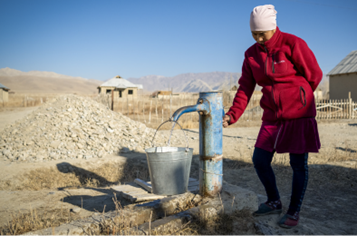Interview with Ian Radcliffe, WSBI / e-MFP
- Nov 11, 2014
- 3 min read

Q:The theme of this year's conference is, "Developing Better Markets." Why do you believe this is an important topic to highlight?
IR:The importance of this year's conference theme of 'developing better markets' is that it comprehensively captures both demand and supply side aspects. It focuses on the 2.5 billion people around the world that lack financial access, takes into account agricultural communities, youth and gender issues and even the very specific challenges associated with former conflict regions. On the supply side, the conference highlights the essential need for ethical values in serving the market responsibly, emphasises customer centricity yet at the same time balances these themes with the constant need for prudent and proficient risk management, which is at the heart of all financial sector activity.
Q: Could you tell our readers about WSBI and ESBG and your role within these organizations?
IR: WSBI and ESBG are international banking associations. WSBI brings together savings and retail banks from 80 countries representing the interests of approximately 6,200 banks in all continents and focuses on issues of global importance affecting the banking industry, whereas ESBG brings together savings and retail banks of the European Union and European Economic Area that believe in a common identity for European policies. Together, the two organizations agree and promote common positions on relevant matters of a regulatory or supervisory nature, foster the exchange of experience and best practices and support members advancement as sound, well-governed and inclusive financial institutions through delivery of world class training and consultancy services, which are also available to other institutions.
I am a Director at WSBI-ESBG, responsible for the group's global training and consultancy activities, with 20 years' experience in leading financial sector programmes and bank reform projects in more than 70 countries worldwide that support international efforts to advance sound, well governed and inclusive financial sectors. I am a Board member and Treasurer of the European Microfinance Platform, and WSBI representative on the Knowledge Committee of the United Nations' managed 'Better than Cash' Alliance. Prior to joining WSBI-ESBG, I worked for National Westminster Bank Plc in the UK and Australia.
Q: At the upcoming conference, you will be speaking during a session titled, "Savings for the bottom of the pyramid: Institutional outreach." If you don't mind, please provide us with a preview of some of the points you will be discussing. Could you explain your perspective on the current use of savings in developing countries, and how this tool could be better utilized to promote poverty reduction?
IR: Based on experiences developed since 2009 in running a 10 country programme known as the 'WSBI Doubling Savings Accounts' programme, I will plan to the scene for this session from the banking sector's perspective in addressing four challenges: i) how to provide usable savings services for the poor, ii) how to do so at a price that they can afford, iii) how to overcome the challenges of lack of proximity, and iv) finally to address some business case aspects in order that the services may be sustainable.
Q: In your opinion, what issue (or issues) must be immediately addressed in order for the microfinance industry to move forward in the coming year? What improvements can European institutions specifically make in regards to this issue? IR: Financial sectors everywhere – including the microfinance industry - are facing a world of disruption from technology, changing customer behaviour and regulation. In the coming years, the delivery of financial services to communities around the world is set to change beyond recognition today. In the new scenarios that are emerging, adaptability and innovation are essential to survival. On the one hand, European institutions can help the developing world through partnership, investment and transfer of know-how; on the other hand, some European players may be surprised at the degree of innovation that is emerging from some developing countries, from which they themselves can learn to the benefit also of European markets.
author: Niamh Watters





Comments